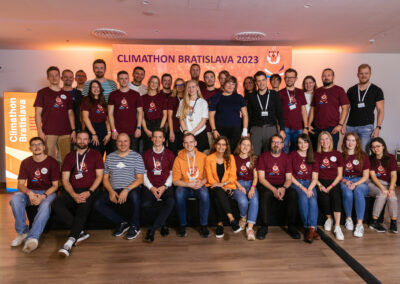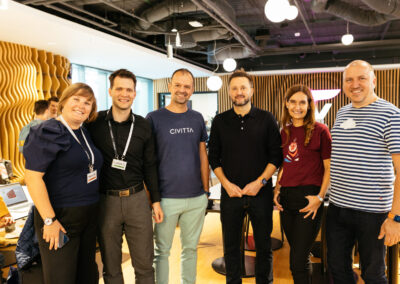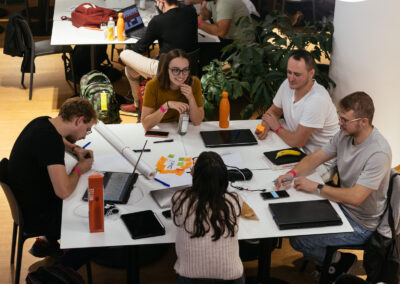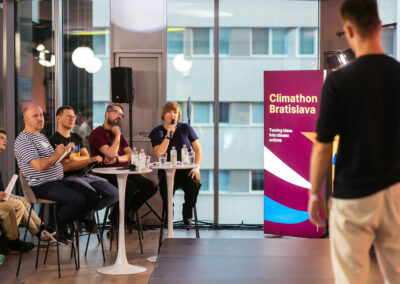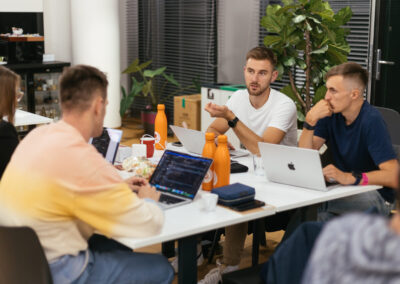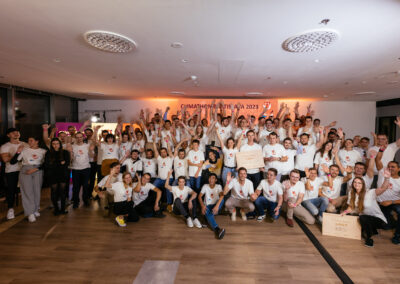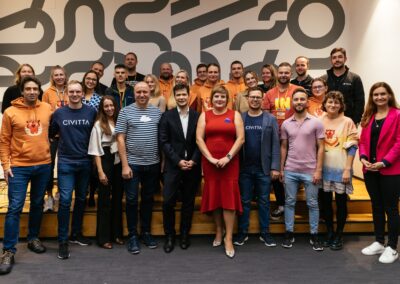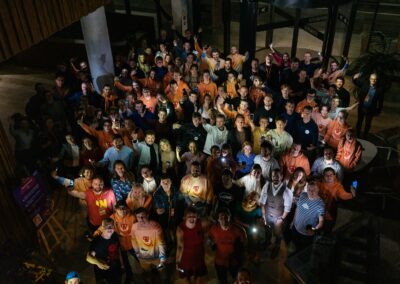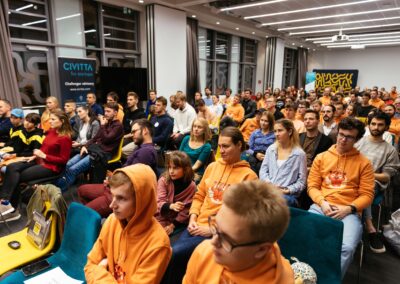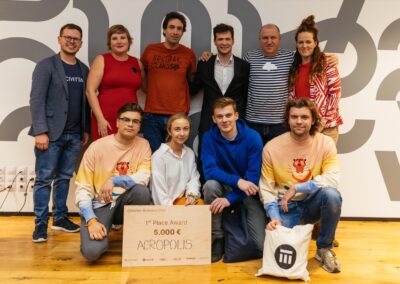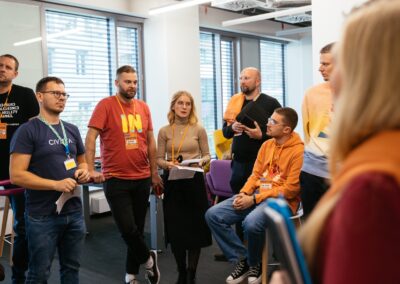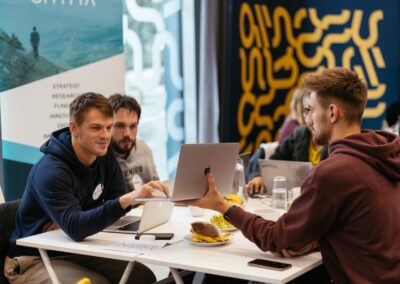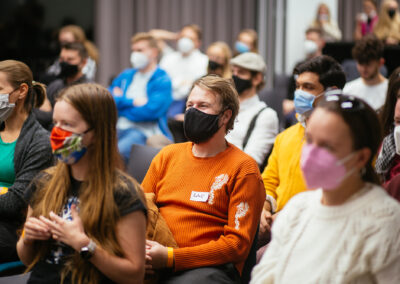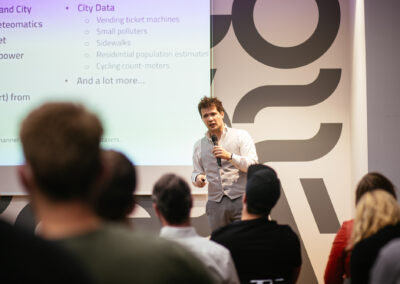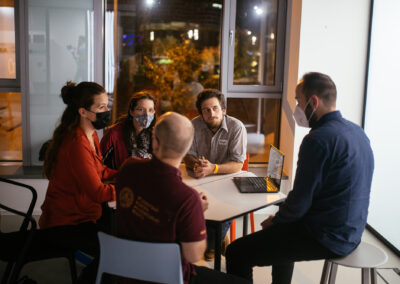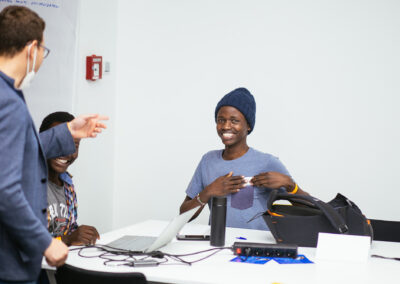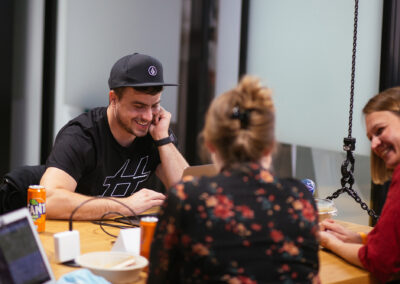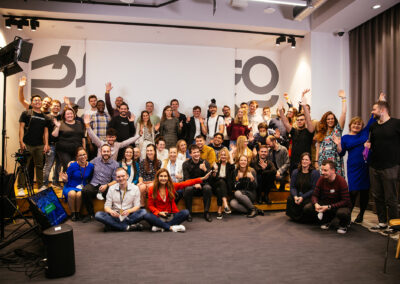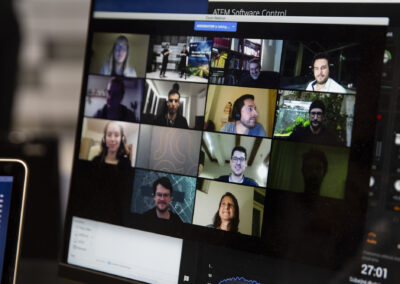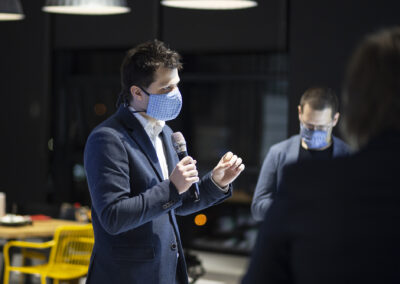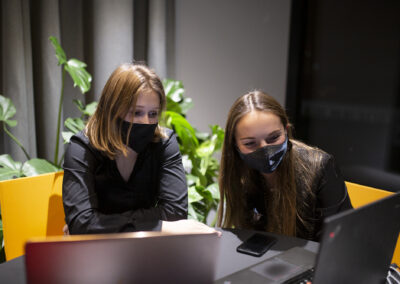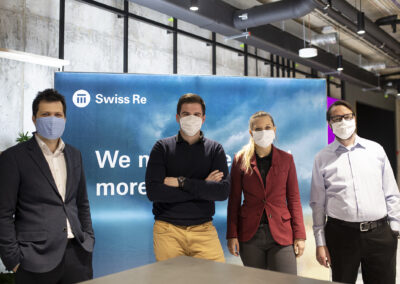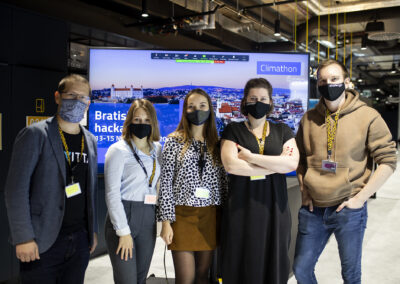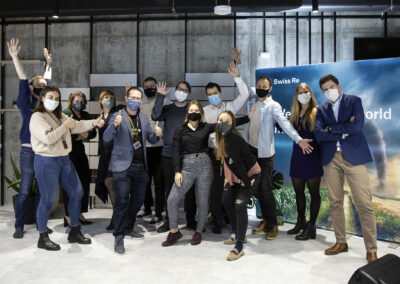
What is
Climathon?
Climathon Bratislava is a high-energy, 48-hour hackathon (hacking marathon) where student teams and tech enthusiasts from all over Slovakia work with city officials, mentors and industry experts.
Our mission is to tackle urban challenges with innovative solutions—all while competing for prizes worth a total of €8,000!
This event is part of a global movement, bringing together over 140 cities from 56 countries to shape the future of sustainable urban living.
In 2024, Bratislava approved its first-ever climate plan (SECAP)!
Achieving the plan’s ambitious targets requires strong collaboration with key stakeholders. Climathon provides a valuable space to develop innovative solutions co-created by the city, engaged citizens, and responsible businesses.
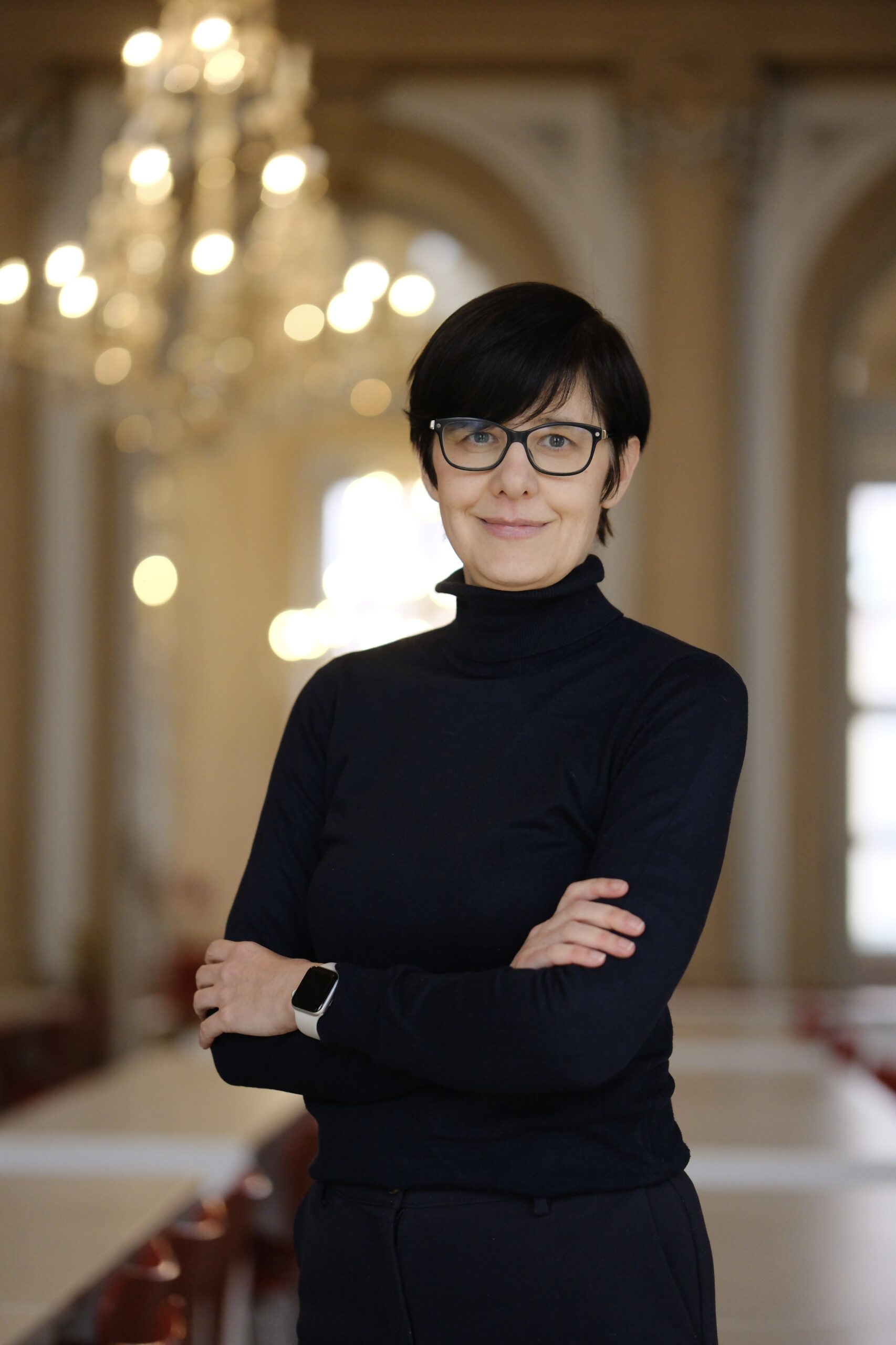
Soňa Andrášová
Urban Strategies
and Analyses Unit
Our goal is
better Bratislava
Bratislava’s vision is to become a resilient and sustainable city! Climathon focuses on improving urban infrastructure and creating services that strengthen climate resilience.
Participants get exclusive access to unique city and partner data, giving them the opportunity to develop innovative, impact-driven solutions.
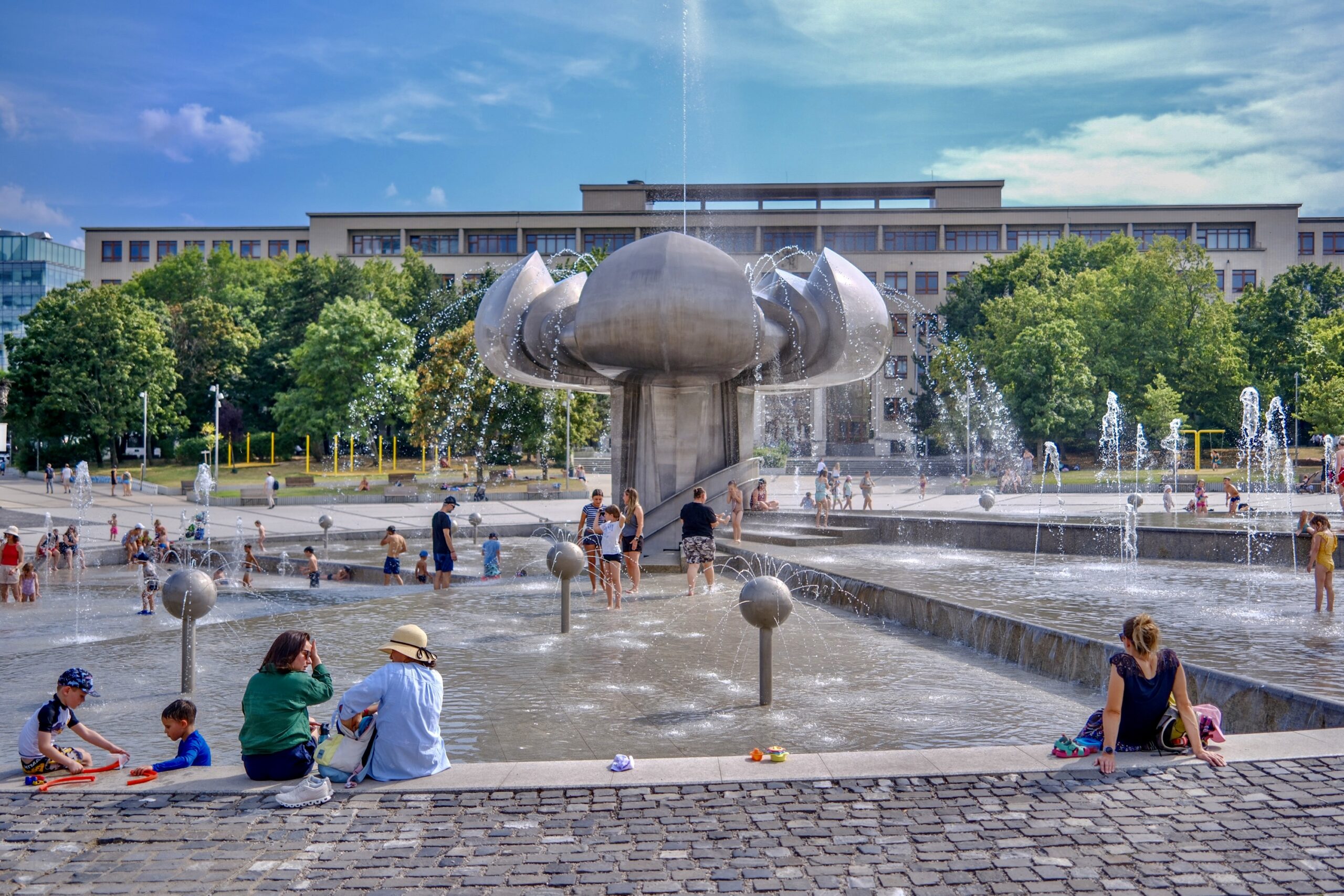
Challenges
In its sixth edition, Climathon Bratislava presents two challenges that respond to the city’s most pressing needs. When designing your solutions, think about their usability and practical impact.
Challenge 1
High schools: Motivate young people in Bratislava to move actively to and from school
Motivate young people in Bratislava to move actively to and from school
The first challenge focuses on encouraging sustainable mobility among young people. Bratislava envisions itself as a climate-resilient city where walking, cycling, and other active forms of transport are part of everyday life. Despite clear health and environmental benefits, many students still commute by car, contributing to congestion and safety concerns near schools.
This challenge seeks creative and feasible solutions that motivate children and students to travel to school actively and sustainably. Solutions should be simple, engaging, and easy to test – ideally ones that inspire real behavioral change and foster healthier habits.
Challenge 2
Urban puzzle: Help Bratislava plan smarter
The second challenge addresses the city’s need to use data for more efficient and sustainable urban planning. Bratislava is growing rapidly and unevenly, while data about urban development, demographics, and infrastructure remain scattered. The vision is to strengthen evidence-based decision-making and ensure that every new project supports a higher quality of life.
This challenge invites participants to develop tools that integrate and visualize data from multiple sources – such as an interactive dashboard or analytical platform – to enable more transparent, informed, and collaborative city planning. The resulting solutions will benefit urban planners, data analysts, developers, and ultimately the citizens, who will gain a clearer understanding of how their city is developing.
Challenges
In the 5th edition of Climathon Bratislava, we have prepared 3 challenges for participants, who can bring their ideas for solutions:
-
- Data for people. How can we better communicate Bratislava research to people?
- Second Chance. How can we give items a better second chance?
- City services. How can we use data to improve city services?
Challenges
In the 4th edition of Climathon Bratislava, we have prepared 3 challenges for participants, who can bring their ideas for solutions:
- How can we make Bratislava and its citizens more resilient to extreme weather events?
- How can we increase participation and engagement of residents in sustainable development of the city using digital tools such as Bratislava ID?
- Open challenge: How can we as citizens help the city become more sustainable and combat climate change?
Mentors
City of Bratislava: Soňa Andrášová, Petra Dzurovčinová, Martin Vavrek, Slavo Oslej, Martin Pinter, Lukáš Polesňák, Zuzana Sidorová, Jakub Hrubý, Rudolf Grujbár, Sabina Hrabinová, Adam Grund, Michal Lisinovič, Adela Syslová, Martina Mihalkovičová, Martin Blaha
Metropolitan Institute of Bratislava: Eva Čulová, Martin Jancovic, Luboš Rybnikár, Marián Rohál
Swiss Re: Uwe Nagel, Tomas Pohl, Matej Gálik
IBL: Michal Weis, Jozef Matula, Michal Brath
BVS: Ladislav Kizak, Juraj Haluška, Matúš Letko
Other mentors: Marian Zachar, Juraj Vilem, Viera Sláviková, Kristína Korčeková, Baška Klimek, Martin Veselý, Lucia Ciranova, Jakub Hrbáň
Video
Photos
Theme
Team from the third year of Climathon Bratislava created innovative technological solutions that improve life in the city and mitigate the impact of climate change.
The participants had three challenges to choose from: how can the city optimize its services in case of extreme weather and climate events, how the city can be better prepared for expected long-term impacts of climate change, and also how citizens can help the city combat climate change.
Participants and teams
200 attendees took part in Climathon 2022, participants formed 29 teams in total. The teams worked for 48 hours in the modern coworking space of the Hub-Hub. At the end of the weekend, 23 solutions were prepared, from which the expert jury awarded the best 3. Climathon participants had exclusive access to data from the IBL Software Engineering company, which they could use and thus ensure greater relevance of their solutions.
Winning solutions
The winning team Acropolis came up with an idea how to optimize and improve the city’s response to extreme weather fluctuations such as heavy rains or floods.
Second place was taken by a group of innovators called Dapper, who offered a solution to optimize road maintenance using critical infrastructure identification.
Third place went to the Drevokocúr team, which presented a solution to make public transport more efficient thanks to the identification of routes that people use most often.
Mentors
During the weekend, teams had at their disposal more than 30 mentors, with whom they consulted their progress and solutions. The mentors passed on valuable experience and knowledge to the participants in the areas of data analytics, transport, innovation, digital services, and climate and environment.
City of Bratislava: Ivana Maleš, Mária Kostická, Martina Mihalkovičová, Slavo Oslej, Lukáš Polesňák, Zuzana Sidorová, Jakub Hrubý, Martin Pinter, Rudolf Grujbár, Adam Grund, Sabina Hrabinová, Michal Lisinovič, Viera Sláviková, Adela Syslová, Petra Dzurovnčinová, Martin Vavrek
Metropolitan Institute of Bratislava: Eva Čulová, Jana Božanová, Martin Jancovic
Swiss Re: Uwe Nagel, Lukáš Csóka, Jakub Ševcech, Matej Gálik
IBL: Michal Weis, Jozef Matula
Other mentors: Guido Oswald, Pavol Magic, Vladimír Klimant, Marek Lavčák, Michal Laco, Anna Pastoreková, Martin Veselý, Kai Pham, Lucia Ciranova, Jakub Hrbáň, Kristína Korčeková, Martin Tuchyňa, Baška Klimek, Matej Choma, Andrea Orsag, Miloslav Michalko and more
Video
Photo
Theme
The challenge of the second year of Climathon 2021 was to find solutions that would make the City of Bratislava more resilient to climate change.
Participants could focus on various areas such as prediction and visualization of climate stressors (heat islands, floods, etc.), more efficient planning of renewable resources, or optimization of waste management, public transport, and electromobility.
Participants and teams
In the second year, 120 participants joined the challenge, of which 50 joined online, and 70 were present in the modern coworking spaces of HubHub. During the weekend, the teams worked on valuable and innovative solutions, and together they brought 15 projects, of which the jury chose the best three. When creating solutions, the teams had actual data available from the City of Bratislava, Swiss Re, and the companies Solargis, Meteomatics, ZSE, and the city´s company OLO.
Mentors
Experienced mentors guided the participating teams from various fields such as energetics, transportation, technology, and the environment. This year, more than 25 mentors were present, and together with the participants, they created ideas that the teams turned into functional solutions.
City of Bratislava: Ivana Maleš, Eva Streberová, Petra Dzurovnčinová, Martin Vavrek
Swiss Re: Uwe Nagel, Lukáš Csóka, Jakub Ševcech
ZSE: Marek Tomeš, Miroslav Bištuť, Rastislav Žembery,
Other mentors: Guido Oswald, Pavol Magic, Vladimír Klimant, Marek Lavčák, Michal Laco, Martin Veselý, Kai Pham a ďalší
Winning solutions
The winning team KANthon created a solution in the form of a comparator, thanks to which it is possible to evaluate the length of the journey by car compared to public transport between different places in Bratislava. Thanks to the data in the comparator, it is possible to find out which routes are worth taking by public transport and which by car.
Second place went to Ecothusiast, which created a tool capable of identifying the presence of heat islands in different parts of the city based on several factors. The benefit for the city is detecting temperature changes after planting greenery on specific streets.
Third place was awarded to the UnderBranc, who came up with the idea that makes waste collection more efficient. The mobile app allows residents to notify when the trash can is full easily.
Video
Photo
Themes
During the first year of the Climathon, the City of Bratislava defined two challenges that the participants had 48 hours to deal with.
1. How to motivate citizens and involve them in transforming Bratislava into a resistant city to climate change?
2. How to increase the use of urban transport and ecological transport alternatives in the city?
Participants and teams
In the first year, 150 participants from 8 countries participated in the search for solutions, who were divided into teams of 3-7 participants. During this weekend, the participants came up with 25 resulting projects, the best of which were piloted and tested in the city.
Mentors
While working on technological solutions, the teams had at their disposal 26 experienced mentors from various fields, including data analytics, transportation, the energetics sector, and climatology. Thanks to their expertise and experience in the area, they were able to help the participants create feasible and viable projects.
City of Bratislava: Headliner: Eduar Donauer, Milota Sidorová, Pavol Škápik, Tomáš Peciar, Petra Dzurovčinová
Swiss Re: Headliner: Lukáš Csóka, Uwe Nagel, Alicia Montoya, Jakub Ševcech
Other mentors: Vladimír Klimant, Matej Gálik, Adrián Gubčo, Pavol Magic, Pavol Vančo, Andrej Garaj, Kristína Korčeková, Marcel Klimo, Ján Búza, Heliodor Macko
Winning solutions
Holandská spojka is the winning idea that offers cities and residents data on overheating individual city locations. Along with this solution, the Holandská spojka provides specific ways that the municipality can prevent overheating (expansion of greenery). In the application, it is possible to see what effects the recommendations will have on the temperature in the given location.
The winning project of the student category – Swiss Re Students, came up with the idea that thanks to machine learning help to predict city traffic delays and increases the reliability of the arrival of public transport vehicles on time. By using data on the hold of connections from previous months, the system can reduce this time in peak traffic by up to 47%. This service should be integrated into the standard mobile application of the transport company.
Other award-winning solutions:
Main Category
Clima-x is a crowdfunding platform where you can round up the amount for your purchase and use it to support green city projects.
Student category
The City Intelligence Lab team’s project offers an idea in the form of an app for cyclists and pedestrians that can calculate their route to avoid possible rain. This idea has great potential in Bratislava because it rains almost 30% of the days a year.
Geo-Idea Special Prize
It acquired the GOOD solution offering an analytics website that integrates and evaluates data from green urban areas and models their impact on air pollution. It can help the Magistrate of the capital city make better decisions.
